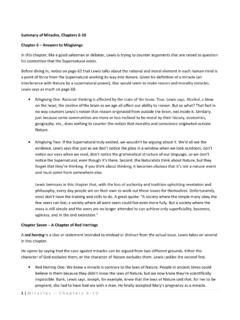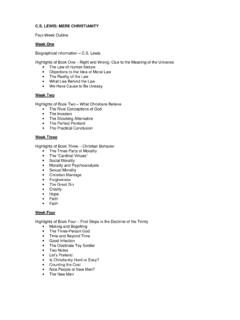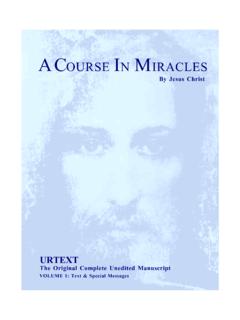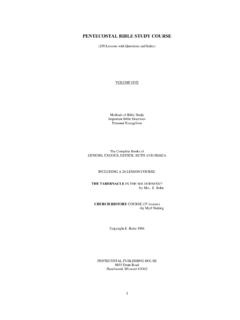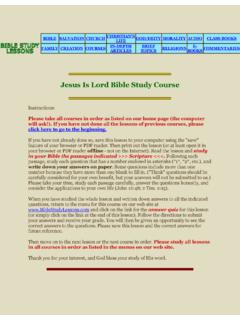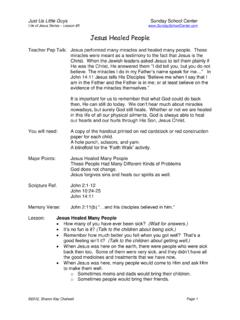Transcription of Summary of Miracles, Chapters 1-5 Chapter One - …
1 1 | m i r a c l e s C h a p t e r s 1 - 5 Summary of Miracles, Chapters 1-5 Chapter One The Scope of this Book Seeing is not believing. We can always say we ve been the victims of an illusion. If we don t allow for the supernatural, then anything that looks like a miracle (an interference with Nature by a supernatural power) will be dismissed as an illusion. If we think miracles are possible but immensely improbable, then only mathematically demonstrative evidence will convince us, and history never provides that level of evidence for any event, so history can t convince us that a miracle has occurred. The first thing that has to be done before we ask whether a miracle can occur is to settle the philosophical question: Do we acknowledge and allow for the supernatural, or not?
2 The next few Chapters work through this question. Chapter Two The Naturalist and the Supernaturalist Definition of miracle : an interference with Nature by a supernatural power Nature is what happens of its own accord, what you don t need to labor for, what you get if you do nothing to stop something from happening Naturalist Supernaturalist Nature of Reality (pp. 7-8) Nothing exists outside nature, defined as everything or the whole show or all that exists In addition to Nature, something else exists. It is original, self-existent, different from and more important than all other things Free Will (p. 8) No belief in free will.
3 Free will would mean that humans have the power of independent action, that they can do something more or something other than what the whole series of events determines. (Implied, not stated) Believes in free will, that a human can choose a course different from that dictated by how events unfold or by how instinct would lead someone to behave. View of Reality (p. 9) A democratic view of reality .. all things and events are equal, so one thing or event is as good as another. Monarchical. The privilege of being on its own is reserved for only One Thing. Everything else is dependent on and derived from that One Thing. View of God Might admit to a kind of God that is produced as the human mind arises.
4 (A great cosmic consciousness) God stands outside Nature and made it. Other interesting thoughts in Chapter Two: There might be other natures of which we re totally unaware. God might actually allow selected events in one to produce results in another. 2 | m i r a c l e s C h a p t e r s 1 - 5 It doesn t necessarily follow from Supernaturalism that miracles occur or have occurred. But, if Naturalism is true, then miracles as defined in this Chapter cannot happen. There would be no Supernatural to interfere with Nature. Chapter Three The Cardinal Difficulty of Naturalism NOTE: Lewis rewrote this Chapter in 1960 after a debate with being challenged by a philosopher, Elizabeth Anscombe, a devout Roman Catholic.
5 We re reading the rewrite, which introduces the ground-consequent idea as well as the cause-effect idea. A major theme of this Chapter is the importance of reason. We make sense out of what we experience sounds, colors, shapes, pleasure and pain with reason. We infer everything we know from our sensations. We infer Evolution from fossils. We infer the existence of our own brain from what we find inside the skulls of other creatures. Unless human reasoning is valid, no science can be true. No account of the universe can be true unless it allows for our thinking to be a real insight. (And naturalism doesn t do this, Lewis would say.)
6 Naturalism discredits our processes of reasoning or at least reduces their credit to such a humble level that it can no longer support Naturalism itself. Acts of thinking are a very special sort of events. (And remember, the naturalist says one thing or event is as good as another.) Acts of thinking are about something other than themselves and can be true or false. Events in general are not about anything and cannot be true or false. We can know nothing unless the act of inference is the real insight it claims to be. Any thing that professes to explain our reasoning fully with introducing an act of knowing solely determined by what is known is really a theory that there is no reasoning.
7 It is agreed on all hands that reason, and even sentience, and life itself are late comers in Nature. If there is nothing but Nature, then reason must have come into existence by a historical process. There was no Designer, and until there were thinkers, there was no truth or falsehood. So for the naturalist, rational thinking must have been evolved by natural selection. Once, then, our thoughts were not rational. The question Lewis is raising is, How, then, did reason begin? Animals come to have expectations, such as where there s smoke, there s fire. But they can never get to the point of inference and of saying, That s usually but not always true.
8 The Naturalist and the Supernaturalist both grant that we reach truth by inferences. But the Naturalist has no way to explain how we came to reason. Natural selection doesn t work; where did the first manifestation of reason come from so that it could be selected and expanded? For the Supernaturalist, reason didn t evolve through Nature. Reason is older than nature, and the orderliness of Nature is derived from it. Similarly, the human mind, in the act of knowing, is illuminated by Divine reason. It is set free from non-rational causation. 3 | m i r a c l e s C h a p t e r s 1 - 5 Chapter Four Nature and Supernature Pleasure, pain, fears, hopes, affections and mental images all can be regarded as parts of Nature.
9 The most important distinction for Lewis is between Reason and Nature. Rational thoughts enable us to alter the course of Nature. Examples? Air-conditioning, the Hoover Dam, space exploration, medical breakthroughs. Nature can t produce rational thought, but it can destroy reason disease, natural disasters, etc. Relationship between Reason and Nature is asymmetrical. Reason is not related to Nature as Nature is related to Reason. Not brother to brother, but father to son. We ve seen that Reason is independent of and above Nature, but it doesn t follow that Reason exists absolutely on its own. Things that exist on their own must have existed from all eternity, and they must exist incessantly.
10 If it ceases to be, it can t call itself into existence again. We are not eternal, self-existent Reason. Our power of reason has developed over time, and it ceases to exist each night when we sleep. So our minds have tap-roots in an eternal, self-existent, rational Being God. It s not accurate to say that God simply thinks through us once in a while. Reasoning doesn t happen to us; we do it. Human thought is not God s but God-kindled. Man s rationality is the little tell-tale rift in Nature showing there is something beyond or behind Nature. You can be a Naturalist and believe in a certain kind of God a cosmic consciousness.
